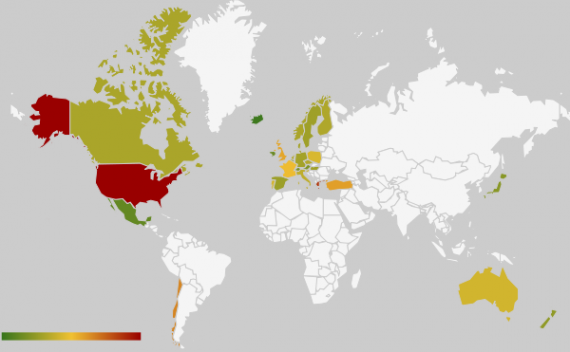US Competitive Balance
Not only is the US outspending all our allies and competitors combined in real dollars on defense, we're doing so in terms of GDP as well.
Commenter John Personna passes along a Reuters blog post by Cate Long titled “It’s the military, stupid.” I commend it to you in full but the upshot is a comparison of two heat maps based on World Bank data:
Total taxes as a percentage of a country’s GDP
Military spending as a percentage of a country’s GDP
She concludes:
America could be much more competitive, balance the budget and reduce the national debt if we brought our military expenditures in line with our global competitors. This would result in hundreds of billions of dollars in annual savings. For some odd reason the Chamber of Commerce prefers to insist that social entitlements are the sole cause of the federal deficit. Let me just suggest to the Chamber, “It’s the military, stupid.”
Now, I’m not sure how useful spending as a percentage of GDP is as a gauge of prudent defense spending. While I’m skeptical of the degree to which the United States is committed to foreign occupations, I nonetheless believe we have global interests in a way few do. Further, I’m deeply concerned about how little our traditional NATO allies–particularly the UK, France, and Germany–are spending on defense.
I played around a little with the World Bank data, keeping only the five most recent years and adding a column for arithmetic mean. Here are the top 20 countries in the world for that period:
The world average over the period 2005-2009 was 2.48% of GDP going to military. The US total of 4.18 is significantly higher, but good only for 16th place.
Then again, everyone above us on the list is a basket case and/or actually at war. None of the major allies or competitors makes the top 20. Some selected others:
- Russia (21st): 3.72
- UK (45th): 2.46
- Turkey (46th): 2.44
- France (48th): 2.39
- China (63rd): 1.96
- Australia (67th): 1.90
- Germany (105th): 1.32
So, not only are we outspending all our allies and competitors combined in real dollars, we’re doing so in terms of GDP as well. China, the bogeyman cited as the most likely peer competitor over the last 20 years, is spending less than the world average.
Again, I’m not sure this tells us anything definitive. It doesn’t necessarily mean, for example, that we should cut defense spending down to 2.48% of GDP. We need a strategic assessment of our diplomatic and political goals to know that. But, given that our economic might was the cause of our rise to number one status in the world a century ago and that we’re losing that lead, it would seem to be another data point in the argument that defense spending is a part of the answre.









Yes but, the 15 countries with higher military spending as a percentage of GDP are all “pretty messed up.”
That is, they are driven for various unhappy reasons to commit a high percentage of their economy to maintaining a militarized state.
Using your list, I don’t think we should be in that top 20. We don’t have the same survival (or police-state) issues.
Oh, concur–it was my point, really. Not good company at all.
In terms of the developed world, there doesn’t seem to be any real correlation between GDP% going to defense and economic success, at least scanning the list and using intuition on economic success.
@john personna: No, but we do have power-projection issues. We want to be able to intervene/influence any place on the planet, on very short notice. Maintaining a military that can do that (as opposed to basic self-defense/deterrence) is an enormous multiplier on cost.
Now, as to whether that’s a realistic _goal_ to have for one’s military – that’s another debate. All I’m saying is that there’s a very good reason _why_ our military costs so frigging much.
@legion:
It’s worse than that. Someone can refresh my memory, but I think we’re up to a “requirement” that we fight 3 major wars at once.
Interesting. The % I’d seen for our military spending was close to 5% of GDP (4.8% I think). You’re getting 4.2%.
It should probably be noted that we spend less now than we did during the cold war, by % of GDP. I happen to think this drop is appropriate, and I’d like to see it continue to drop (slowly).
Like any other spending I’d be cautious about cutting – you have to actually find things that make sense to cut rather than blithely saying cut X% without regard to the results of that. Also, cuts should be phased in over time so as to reduce the shock. After all, a sharp reduction in military spending in the short term would be bad for similar reasons that slashing other government spending in the short term would be bad.
@legion:
We got some issues all right
I have to say, I am not at all sure that it is a good reason.
How about this:
“It’s military and entitlement spending stupid.”
Of course, military spending might be high because we’re in two wars – I think if China (or any country, really) was keeping 100k+ troops deployed half-way around the world for practically a decade, then I bet they’d be spending a lot more. So “hundreds of billions” can be saved by getting out of Iraq and Afghanistan – and those hundreds of billions WILL be saved because wars don’t last forever – the only question is when.
Of course if we’re talking about future deficits – and those are the deficits that really matter, then entitlements (especially health care) are THE major cause. Whatever the biases of the Chamber of Commerce, the simple mathematically reality is that the quoted statement above is simply not true. Even if we zeroed out the defense budget entirely we’ll still be deficit spending.
@Andy:
There is a “war forever” lobby. It’s really what the neocon vision was about, joining Israel in the permanent war against the axis of Oil and Islam.
@john personna: Quite. Although I’m not sure what the current definition of major/minor is these days, considering China’s about the only potential opponent that competes in the ‘major’ category.
@OzarkHibilly: Heh. Perhaps “good” is the wrong characterization…
JP,
The simple fact of history is that all wars end; again, the only question is when. Lobbies may be powerful, but they are not that powerful.
I keep hearing about China as a potential threat, but can anyone make a case on the map, in the real world, for some sort of major land war with China?
There’s Taiwan, but even if war broke out there — quite unlikely — China has itself one hell of a serious problem launching an invasion. That’s 80 miles of open water and this isn’t 1944 where an invasion fleet can be launched unobserved. Taiwan has its own navy and air force and we have a fleet in the Pacific.
Where else is our potential war front with China? On the Korean peninsula? Possible, I suppose, but to what end? To absorb North Korea? To help North Korea take on South Korea, a major trading partner? For what purpose?
I don’t think those kinds of wars of territorial conquest make much sense any more. China vs. Japan? Why? Because they’re creeped out by Japanese game shows?
What we need to focus on is an ability to reach out and seriously harm people who use terror to attack us, threats to oil supply, electronic threats, etc… We need to be doing more about computer security, and we should prepare for biological threats — whether man-made or simply evolving — and we need to be able to bring the pain — preferably through remote-control robotic weapons systems. Massed tank battles? Major naval battles? Not so much.
And the military is a terribly poor tool for that. Yeah, Navy Seals killed OBL… But it was not the Army, Air Force, Navy or Marines that got him. It was the Intelligence community that got him.
we are a low tax country that spends a sh**-load on defense.
hmmm…we better throw grandma from the train to pay for it.
What is included in the calculations for “defense” spending?
Homeland Security? The Department of Energy handles many nuclear sites and they have a separate budget. Veterans Affairs? is that included?
The nominal defense budget was about $590 billion without the wars added and any of the above departments added.
Many estimates believe that the truer costs are about $1 trillion so the % of GDP is actually much higher than these estimates.
@OzarkHillBilly…
Yes…exactly…
Cheney made a big f’ing deal that terrorism was NOT a law enforcement problem. Almost everything that has happened since 9.10.11 has proven him wrong. Was he ever right about anything?
James Joyner said:
“I nonetheless believe we have global interests in a way few do.” If the we is multinational corporations that’s true. If the we is the majority of the American people it’s false.
@Hey Norm: Keep in mind Norm Chenny’s goal was to use war to get Halliburton out of the financial hole. It was near bankruptcy in 2000. It worked!
@Hey Norm:
Uhhhh, “Deficits don’t matter”?
A few months ago, Dan Drezner linked to a heritage org report on defense spending:
http://www.heritage.org/research/reports/2010/06/us-defense-spending-the-mismatch-between-plans-and-resources
While it’s largely what you might expect, it does have a couple rather interesting charts when you dive into it deeply. In particular, there are two worth thinking about — both tying into the question of how are our dollars being spend when it comes to defense and what is the ongoing cost of these recent wars:
Shifting Balance of Defense Budget (projected to 2028)
http://www.heritage.org/research/reports/2010/06/~/media/Images/Reports/2010/b2418_chart4.ashx
Projected Military Medical Costs (projected to 2028)
http://www.heritage.org/research/reports/2010/06/~/media/Images/Reports/2010/b2418_chart5.ashx
The net result is that maintenance and human related costs — operations, staffing, benefits, and paying for medical costs (military “entitlement” programs) — are going to reduced the amount of r&d money and keep procurements of new tech more or less flat.
Thinking about reducing the size of our forces, the current level of engagements, and closing bases could, theoretically, allow for us to meet our existing committments to troops, increase the amount of R&D (which can then help drive innovation), and possibly even improve manufacturing… seems to me a far better usage of that existing 4.x% of GDP (maybe even do all that and hope for a decrease in overall spending).
Yeah, I know it’s a pipe dream… especially with the misunderstood “threat” of China as a great boogeyman that fuels the nightmares of so many.
@mattb:
And feeds the wallets of so few.
@Andy:
Israel has been at more or less war for a couple generations. That is the actual battle that the neocons wanted to join. Now, you can say “a couple generations isn’t forever,” but for me it is enough. Way more than enough.
@michael reynolds:
Ah, we institute a protective tariff, and China lands troops to ensure tax-free delivery to Walmart..
Bachmann has warned against cuts to military spending because the Soviet Union is becoming too powerful:
http://www.rawstory.com/rawreplay/2011/08/bachmann-americans-fear-the-rise-of-the-soviet-union/
I think we should listen to her.
@john personna:
“more or less” being the operative term. If armed forces are not fighting, then it isn’t war.
@Ben Wolf: Yes indeed we should be afraid of something that hasn’t existed for 30 years.
@Andy:
So, you noticed Israel on the list up top, right? Their spending is 7.26% of GDP.
If this is a thread about defense spending and a war footing, you aren’t doing much to prove that “not fighting” equals low spending.
JP,
I never said that “not fighting equals low spending.” Indeed for most of the Cold War where we were not actually fighting we were spending much more than we are now (relative to GDP). My point was that a large reason why defense spending is higher now than it otherwise would be is because we are fighting two wars. Those wars cost hundreds of billions annually. Those wars aren’t going to last forever and once they are over we won’t be spending that money on current military operations anymore.
So I’m not sure what your argument is with regard to this neocon “forever war” lobby. “Forever war” is an impossibility since wars cannot last forever, which was my point. What is your argument? Is it that the neocon lobby will keep us in Iraq and Afghanistan forever, or something else?
@Andy:
Maybe you should just re-read. Neocons. Permanent war against oil and Islam. Israel. 7.26% of GDP.
@john personna:
What’s your point? What is “permanent war against oil and Islam?” It’s a catchy phrase but what does it mean in terms of the discussion here – the US budget and deficit?
My point is pretty simple – a sizable portion of our defense spending is going to current operations – ie. the wars in Iraq and afghanistan. Once those wars end that spending will cease. If you think that is not the case, then present your argument.
@Andy:
You have had plenty of time to understand above, but if you want, there is a book length treatment on the same subject:
Washington Rules: America’s Path to Permanent War
Available at amazon.
@john personna:
Yes, I’ve read it. He doesn’t address my point, which is that wars end and when they do, the money that gets spent on those wars either doesn’t get spent or goes toward something else. In fact, if you look at the time period when the “Washington Rules” have been in effect, my point stands because spending dropped after WWII, after Korea and after Vietnam. It’s going to drop once these wars are done too. That is something completely different from Bacevich’s thesis, which I largely agree with.
“Plenty of time” doesn’t help me when you’ve yet to make a coherent argument or at least directly dispute that point. Vague references to the neocon lobby, Israeli defense spending and Bacevich’s book don’t make much sense to me, sorry.
I would not bet the farm on that. The people who are profiting from this will not give up those profits lightly.
@anjin-san:
I would not bet the farm on that. The people who are profiting from this will not give up those profits lightly.
Almost 2/3 of the money spent on these wars is going to fund current operations, called O&M (operations & maintenance) money. If the wars end, we stop spending that money. O&M is stuff like fuel, transporting personnel and equipment, ammunition, equipment maintenance, base support and logisitcs, etc. You don’t spend O&M money unless you’re actually doing operations.
The next biggest line-item is procurement, at about 15% of the total war cost. This mainly buys replacement equipment and for this war the vast majority went into purchasing MRAP’s and other IED resistant vehicles. It’s likely that some procurement will continue after the wars end in order to recapitalize equipment, etc.
The third biggest item at ~10% of war spending is military personnel costs. Those aren’t going to go away but that’s also not an area where “people are profiting” either unless one believes that pay and benefits for service are profits.
Next up are the special funds at ~7% of spending and almost all of these are spend on the training programs for the Iraqi and Afghan security forces. Some training would probably continue once the wars are over.
Everything else only amounts to 3% of war spending.
So, at least 2/3 of our current war spending will go away once these wars end. Where can these people, whoever they are, get their profits if operations cease? Procurement, maybe training if it all gets outsourced, plus all the little stuff in that last 3%.
So, I’ll state again that spending will go down once these wars end and it will go down by a lot – probably at least $100 billion a year. I don’t think there is anyway that the neocon lobby or the “people who are profiting” from these wars (whoever they might be) can get around the simple fact that most war money is O&M money and it goes away once the war ends. Anyone who believes otherwise will need to show their work.
You can read more details in this CRS report (PDF File) which is where I got the figures above (see table 7.)
@Andy:
In how many countries have we had “operations” in the last year? If we count drone and air strikes the list is fairly long: Iraq, Afghanistan, Pakistan, Somalia, Libya. More?
How does that “war” end exactly? Do we sign an armistice with anyone in particular? Does it take any one man or group to surrender? No, what it takes is us deciding that there aren’t foes significant enough to battle out there,
I don’t see that on the horizon, and the argument that it “must” happen “someday” isn’t very reassuring. You certainly don’t know when, but you want to count defense savings as if it’s happened.
Ah, I’d forgotten that James had an Atlantic article along those lines:
How Perpetual War Became U.S. Ideology
@john personna:
Every war in the history of mankind came to an end. If you think this war or these wars are somehow different then you’ll need to explain why. As I said in my first comment it’s not a question of if, it’s a question of when. Furthermore, when these wars end we will spend less money which will help our deficit situation which was the point of this post. $100 or so billion per year is pretty significant I’m not sure why either of these ideas should be controversial or in dispute.
Yes, we have a variety of operations around the world. The financial costs of most of them are not much compared to Iraq and Afghanistan and the reason is supporting armies composed of tens-of-thousands is expensive while something like UAV’s are comparatively much, much less expensive. Any operation we stop will save money, but the big savings are found in Iraq and Afghanistan. Again, what is your point? These “questions” you keep asking must lead somewhere.
@Andy:
You are playing with timescales, to start with. We are talking about current and near future costs, and you are saying things can’t go on forever. Serious?
I’ve asked you when things will stop, and then you whinge about what is an operation and what isn’t. You do that while ignoring the Israeli and other examples (above in the table) where countries spend huge amounts without being in active, shooting, wars all the time.
And then you want me to prove the obvious, again and again? To prove something that is staring you in the face?
At this point I think you are either really stubborn or really stupid, and I can’t help that.
Andy, your argument is really based on a promise you can’t make. You can’t tell me when the war, the united war across Iraq, Afghanistan, Pakistan, Somalia, and Libya, will end.
You just promise that it will end someday, and so we should book the savings.
Or, in other terms, you are giving me a variation on “the check is in the mail.”
Unless the culture of the US foreign policy establishment changes, the savings from the eventual end of Iraq, Afghanistan & Libya will go to (drumroll)… THE NEXT WAR.
Andy,
While it is true that all wars end, what is important to look at is the historical data. Again from the Heritage Foundation Paper:
http://www.heritage.org/research/reports/2010/06/~/media/Images/Reports/2010/b2418_chart2.ashx
Note that, at least as a component of GDP, our military spending has remained relatively consistent since the end of WWII. Granted, we can argue about Korea, Vietnam, and the Cold War. All of those would suggest — sadly — that within a decade of ending our present conflicts we’ll be engaged in a military action in some other part of the world.
@john personna:
You are playing with timescales, to start with. We are talking about current and near future costs, and you are saying things can’t go on forever. Serious?
Who was it that brought up “forever war?” That’s what I’m responding to. I don’t know when these wars will end. I’m not an oracle. I do know they can’t last forever. That’s relevant to future costs.
I’ve asked you when things will stop
No you haven’t. Reread your comments and maybe consider answering some of your own questions while you are at it. “Forever war” isn’t very helpful.
You do that while ignoring the Israeli and other examples (above in the table) where countries spend huge amounts without being in active, shooting, wars all the time.
That’s a point I haven’t disputed. Israel is irrelevant since we are not Israel. None of that changes the fact that wars cost more than than the baseline defense budget and when those wars end the costs go down. You seem to imply this isn’t the case, yet you won’t come right out and say so, so I don’t know what your argument is. Now, maybe one could argue that O&M money from the wars would be rolled into the baseline defense spending once the wars are over resulting in no decrease in defense costs. That would be an interesting debate but it’s not a position you’ve taken here – I’ve asked a couple of times now – what is your position? What is your argument? You don’t seem to have one.
You just promise that it will end someday, and so we should book the savings.
No, I’m not “booking the savings.” I’m simply pointing out the history on war budgeting and this point is pretty clear – when military operations begin, defense spending goes up and when they cease, defense spending goes down. Regardless, guess what? The CBO, and White House 10-year budget projections assume that defense spending will go down for the reasons I’ve outlined in this thread. If they are wrong to take that approach then let’s hear why.
And then you want me to prove the obvious, again and again? To prove something that is staring you in the face?
At this point I think you are either really stubborn or really stupid, and I can’t help that.
Ah yes, “the obvious,” which is so obvious that you can’t seem to put it into words or state an actual position. So obvious the CBO and White House budget people make the same arguments I make. So obvious that the historical record on such matters is meaningless. This is yet another non-argument. People who make claims are generally required to back those claims up. My positions here are well supported by the historical record. But whatever – now you’ve started in with the ad hominem so I see that further discussion is a waste of time.
Your sort of assuming you know something others don’t. Perhaps the money will not be spent in exactly the same manner, but I would say there is a pretty good chance it will remain in the DoD budget.
@anjin-san:
Based on what? I’m not discounting that possibility (see my latest comment to JP), but rolling that money into other parts of the budget is not how it’s gone in the past. Since this is the future we’re talking about there is obviously a lot of uncertainty. I’m perfectly willing to throw the historical pattern out the window provided there is some evidence to do so. So far no one’s presented any nor even speculated as to where that $100 billion plus annual expenditure would go. If there’s an argument to be had there for why it would remain in the DoD budget, then let’s hear it. So far it’s all been vague references to neocons and profits along with a lot of handwaving.
tyndon:
This is an important point. What we call “defense” spending is understated by a large amount. One item you didn’t mention is interest.
Bush paid for war by creating lots of new debt. We’ll be paying interest on that debt for years, but we don’t count that as part of the defense budget, even though we obviously should. If someone told you that they didn’t count their (tax-adjusted) mortgage interest as a housing cost, you would have no trouble realizing they were kidding themselves. But we kid ourselves, in this exact way, as a nation.
@Andy:
But you don’t actually have a position, unless we use fill-in-the-blanks.
“Someday, in an indefinite future (year ____), wars will end, and spending will fall.”
It is comical. You want a definite proof to disprove an indefinite future.
I cite multiple observers who see the rise of American militarism and adventurism, and you just wave them away. They aren’t as “real” to you as the indefinite future, in year ___.
Again: Andrew Bacevich: how war without end became the rule
As George Patton once said “I don’t like to pay for the same real estate twice”. Once a bureaucracy has it’s paws on budget, they tend not to simply say “Oh, no thanks, we don’t need those billions this year. Please find another way to spend them”.